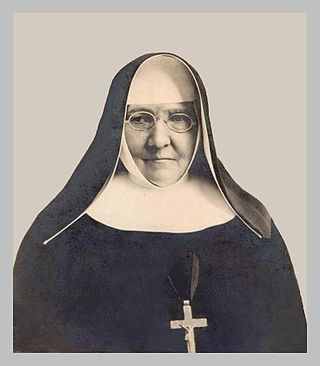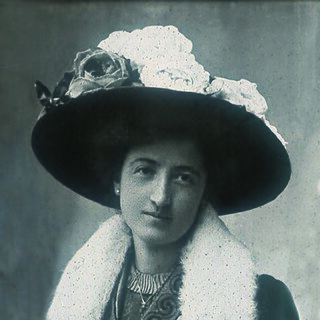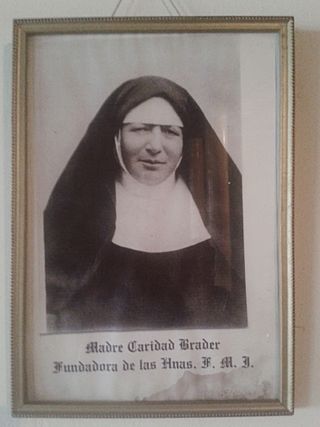Blessed Bruna Pellesi, known as Maria Rosa of Jesus, was an Italian nun who was a member of the Franciscan Missionary Sisters of Christ. Pellesi served as an educator in places such as Sassuolo until she contracted tuberculosis and was moved to various sanatoriums for recuperation until the end of her life when she died in her convent.
Giovannina Franchi was an Italian Roman Catholic professed religious and the founder of the Suore Infermiere dell'Addolorata. Franchi was engaged for a brief period of time and the death of her fiancé prompted her to review her life and what her religious convictions were telling her to do; she had been involved in countless charitable works in the past and so dedicated herself to the care of the ill. Her order became tasked with aiding the ill across Como and the smallpox epidemic in 1871 thrust them into action later claimed Franchi's life.

Assunta Marchetti was an Italian Roman Catholic religious sister and the co-founder of the Missionary Sisters of Saint Charles Borromeo Scalabrinians; she worked in Brazil from 1895 until her death. She has been beatified as a Blessed Mother. Her priest brother Giuseppe is titled as Venerable on the path to sainthood.

Maria Teresa Casini was an Italian nun and was the founder of the Oblate Sisters of the Sacred Heart of Jesus. The order was devoted to providing care for those around them with an added emphasis on demonstrating the love of Jesus Christ while spreading the message of the Gospel to the public.

Małgorzata Szewczyk, also known by her religious name Łucja, was a Polish religious sister and the foundress of the Daughters of the Sorrowful Mother of God – or "Seraphic Sisters"; she was also a member of the Third Order of Saint Francis. Her life was dedicated to the care of ill people and she even spent a long period to that end in Israel and Palestine before returning to her native Poland where she became a close collaborator of Honorat Kozminski. Her initiatives to aid the poor and those in need included tending to elder women in her apartments or in going to hospitals and in the streets to help those that needed her charitable assistance.

Tommaso da Olera - born Tommaso Acerbis was a Roman Catholic Italian friar of the Capuchins. Leading a life of humility and service, Acerbis, initially a shepherd with no formal education, joined the Order of Friars Minor Capuchin in Verona at the age of seventeen. He served in various convents, offering spiritual guidance to the sick and impoverished. Acerbis spoke out against the spread of Lutheranism, defending the Roman Catholic Church through his love for "the impassioned Christ". His influence extended to sponsoring convents and spiritually guiding notable individuals, including Bernardina Floriani and scientist Ippolito Guarinoni. Acerbis's devotion earned him papal veneration, with Pope John XXIII recognizing him as "a saint and a true master of the spirit". The beatification process, initiated in 1967, culminated in his proclamation as Venerable on 23 October 1987. A miracle further validated his cause, leading to beatification on 21 September 2013, presided over by Cardinal Angelo Amato on behalf of Pope Francis.
Teresa Manganiello was an Italian who became a member of the Secular Franciscan Order. She desired to establish a new religious congregation but died before the idea could come to fruition.

Rosa Elena Cornejo Pazmiño, also known by her religious name María Francisca of the Wounds, was an Ecuadorian Roman Catholic religious sister. She established the Franciscan Missionaries of the Immaculata.

Rosa Maria Benedetta Gattorno Custo was an Italian Roman Catholic who was widowed and later became a nun. She was also the founder of the Daughters of Saint Anne and assumed the new name of "Anna Rosa" after she had established her order and made her religious profession as a nun. Her order - after her death - expanded in Europe and other parts of the world.

Blessed Costanza Starace was an Italian Roman Catholic nun. She was the founder of the religious congregation known as the Compassionist Sisters Servants of Mary. Starace later assumed the new name of "Maria Maddalena of the Passion" upon the occasion of her solemn profession. She became a secular member of the Servite Order after she failed to join a religious order.

Armida Barelli was an Italian Roman Catholic who served in the educational field during her life and was also a professed member of the Secular Franciscan Order. Barelli was also the co-founder of the Secular Institute of the Missionaries of the Kingship of Christ. Alongside Father Agostino Gemelli the pair sought to spread the message of the Gospel through their educational facilities and through their congregation that sought also to spread the Franciscan charism.

Leopoldina Naudet was an Italian Roman Catholic of both French and Austrian origins. She was a religious sister of the Congregation of Dilette of Jesus and the foundress of the Sisters of the Holy Family of Verona. Naudet served in the court of Leopold II, Holy Roman Emperor and after his death served his daughter Maria Anna who became an abbess and professed religious alongside Naudet and her sister.

Anna Maria Adorni Botti, born Anna Maria Adorni, was an Italian religious sister of the Handmaids of the Immaculata, a congregation she established in 1857. Botti's vocation was to the religious life and as a child believed she was destined for the missions and later as a Franciscan religious sister. After being widowed she did pastoral work in Parma where she established and ran the congregation of the Handmaids of the Immaculata until her death.

Manuela de Jesús Arias Espinosa, also known by her religious name María Inés Teresa of the Blessed Sacrament, was a Mexican religious sister in the Roman Catholic Church and the founder of both the Poor Clare Missionaries of the Blessed Sacrament (1945) and the Missionaries of Christ for the Universal Church (1979). She lived during the time of the Cristero War and remained out of the nation during some of it in order to avoid the anti-religious persecution of the times.

Maria Clara of the Child Jesus — born Libânia do Carmo Galvão Mexia de Moura Telles de Albuquerque was a Portuguese religious sister in the Roman Catholic Church who established the Franciscan Hospitaller Sisters of the Immaculate Conception in Lisbon. She led the congregation as its superior.

Maria Josefa Karolina Brader, also known by her religious name Maria Caridad of the Holy Spirit, was a Swiss religious sister who founded the Franciscan Sisters of Mary Immaculate. Brader served as a member of the missions in Ecuador for a brief period of time before being transferred to Colombia where she served as a catechist and evangelizer for the remainder of her life.

María del Carmen González-Ramos García-Prieto de Muñoz, also known by her religious name María del Carmen of the Child Jesus, was a Spanish Roman Catholic professed religious and the founder of the Franciscan Sisters of the Sacred Hearts. She married in mid-1857 – against her parents' advice – to a brash and dissolute husband and secured his repentance not too long before his death.
Carmen Elena Rendiles Martínez - in religion María Carmen - was a Venezuelan Roman Catholic professed religious from the Servants of the Eucharist and the founder of the Servants of Jesus of Caracas. Rendiles served in a leadership position for her order in France where she spent her time of religious formation and returned to Venezuela to found her order in 1965 and assume control as Superior-General of her new order.
Maria Gargani, religious name Maria Crocifissa del Divino Amore,, was an Italian member of the Secular Franciscan Order and the founder of the Sisters Apostles of the Sacred Heart. Gargani was involved with Catholic Action during her teaching career but is best known for having been a close friend and correspondent with Pio from Pietrelcina from World War I until the saint's death in 1968; the saint wrote a total of 67 letters to Gargani during this period.
Gaetana Tolomeo - also known as Nuccia - was an Italian Roman Catholic. Tolomeo went through her entire life either confined to her bed or in a chair due to a progressive paralysis that rendered her disabled. Throughout her life she gained a reputation for her piousness and the messages of the Gospel she sought to spread to others while a guest on a local radio station from 1994 until her death. Her time on the radio station marked her interest in reaching out for the conversion of sinners with an emphasis on reaching out to prostitutes or families in need.














